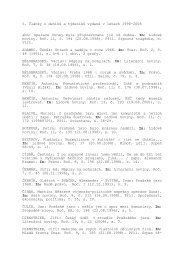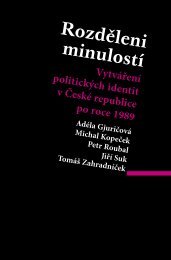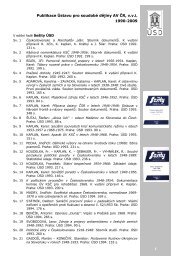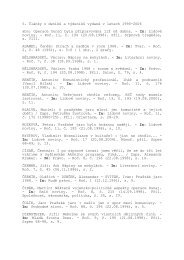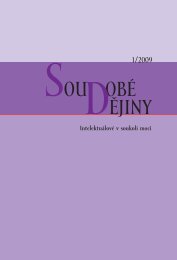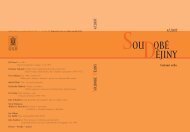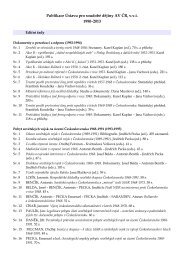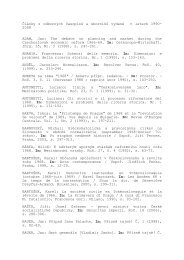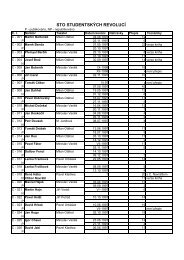- Page 1:
1/2007SOUOBÉDùJINY
- Page 5 and 6:
4 Soudobé dějiny XII / 3-4Matěj
- Page 7 and 8:
6 Soudobé dějiny XII / 3-4ObsahSt
- Page 9 and 10:
8 Soudobé dějiny XII / 3-4Ústav
- Page 11 and 12:
10 Soudobé dějiny XIV / 1jícím
- Page 13 and 14:
12 Soudobé dějiny XIV / 1liber, s
- Page 15 and 16:
14 Soudobé dějiny XIV / 1Dvanáct
- Page 17 and 18:
16 Soudobé dějiny XIV / 1řídit
- Page 19 and 20:
18 Soudobé dějiny XIV / 1něpolit
- Page 21 and 22:
20 Soudobé dějiny XIV / 1rosta si
- Page 23 and 24:
22 Soudobé dějiny XIV / 1forda se
- Page 25 and 26:
24 Soudobé dějiny XIV / 1sku pře
- Page 27 and 28:
26 Soudobé dějiny XIV / 1velké m
- Page 29 and 30:
28 Soudobé dějiny XIV / 1lo v sou
- Page 31 and 32:
30 Soudobé dějiny XIV / 1tra soci
- Page 33 and 34:
32 Soudobé dějiny XIV / 1účtů
- Page 35 and 36:
34 Soudobé dějiny XIV / 1ří mě
- Page 37 and 38:
36 Soudobé dějiny XIV / 1byly vy
- Page 39 and 40:
38 Soudobé dějiny XIV / 1byla zpo
- Page 41 and 42:
40 Soudobé dějiny XIV / 1Češi a
- Page 43 and 44:
42 Soudobé dějiny XIV / 1ho daru,
- Page 45 and 46:
44 Soudobé dějiny XIV / 1Poezie v
- Page 47 and 48:
46 Soudobé dějiny XIV / 1chopitel
- Page 49 and 50:
48 Soudobé dějiny XIV / 1kopat p
- Page 51 and 52:
50 Soudobé dějiny XIV / 1rých č
- Page 53 and 54:
52 Soudobé dějiny XIV / 1v refer
- Page 55 and 56:
54 Soudobé dějiny XIV / 1Hlavním
- Page 57 and 58:
56 Soudobé dějiny XIV / 1rozší
- Page 59 and 60:
58 Soudobé dějiny XIV / 1pečliv
- Page 61 and 62:
60 Soudobé dějiny XIV / 1Báseň,
- Page 63 and 64:
62 Soudobé dějiny XIV / 1sefem Le
- Page 65 and 66:
64 Soudobé dějiny XIV / 1vři mrt
- Page 67 and 68:
66 Soudobé dějiny XIV / 1vědným
- Page 69 and 70:
68 Soudobé dějiny XIV / 1ky i zá
- Page 71 and 72:
70 Soudobé dějiny XIV / 1rek a pu
- Page 73 and 74:
72 Soudobé dějiny XIV / 1Ukázky
- Page 75 and 76:
74 Soudobé dějiny XIV / 1Amfora h
- Page 77 and 78:
76 Soudobé dějiny XIV / 1Sestři
- Page 79 and 80:
78 Soudobé dějiny XIV / 1Bělorus
- Page 81 and 82:
80 Soudobé dějiny XIV / 1tech př
- Page 83 and 84:
82 Soudobé dějiny XIV / 1Předsta
- Page 85 and 86:
84 Soudobé dějiny XIV / 1Na pohle
- Page 87 and 88:
86 Soudobé dějiny XIV / 1K nejvý
- Page 89 and 90:
88 Soudobé dějiny XIV / 1Bělorus
- Page 91 and 92:
90 Soudobé dějiny XIV / 1reflekto
- Page 93 and 94:
92 Soudobé dějiny XIV / 1Obálka
- Page 95 and 96:
94 Soudobé dějiny XIV / 1Přehled
- Page 97 and 98:
96 Soudobé dějiny XIV / 1Henijuš
- Page 99 and 100:
98 Soudobé dějiny XIV / 1působil
- Page 101 and 102:
100 Soudobé dějiny XIV / 1Krečeu
- Page 103 and 104:
102 Soudobé dějiny XIV / 1kud byl
- Page 105 and 106:
104 Soudobé dějiny XIV / 1val na
- Page 107 and 108:
106 Soudobé dějiny XIV / 1Horizon
- Page 109 and 110:
108 Soudobé dějiny XIV / 1a polit
- Page 111 and 112:
110 Soudobé dějiny XIV / 1Na děj
- Page 113 and 114:
112 Soudobé dějiny XIV / 1použij
- Page 115 and 116:
114 Soudobé dějiny XIV / 1loniemi
- Page 117 and 118:
116 Soudobé dějiny XIV / 1zdravot
- Page 119 and 120:
118 Soudobé dějiny XIV / 1uspokoj
- Page 121 and 122:
120 Soudobé dějiny XIV / 1dějin
- Page 123 and 124:
122 Soudobé dějiny XIV / 1Význam
- Page 125 and 126:
124 Soudobé dějiny XIV / 1Recenze
- Page 127 and 128:
126 Soudobé dějiny XIV / 1kých p
- Page 129 and 130:
128 Soudobé dějiny XIV / 1ní kul
- Page 131 and 132:
130 Soudobé dějiny XIV / 1kultury
- Page 133 and 134:
132 Soudobé dějiny XIV / 1vání,
- Page 135 and 136:
134 Soudobé dějiny XIV / 1Toto z
- Page 137 and 138:
136 Soudobé dějiny XIV / 1Knapík
- Page 139 and 140:
138 Soudobé dějiny XIV / 1Tuto sk
- Page 141 and 142:
140 Soudobé dějiny XIV / 1Henlein
- Page 143 and 144:
142 Soudobé dějiny XIV / 1Recenze
- Page 145 and 146:
144 Soudobé dějiny XIV / 1a vší
- Page 147 and 148:
146 Soudobé dějiny XIV / 1proudů
- Page 149 and 150:
148 Soudobé dějiny XIV / 1Omer Ba
- Page 151 and 152:
150 Soudobé dějiny XIV / 1ce“ a
- Page 153 and 154:
152 Soudobé dějiny XIV / 1budou s
- Page 155 and 156:
154 Soudobé dějiny XIV / 1Recenze
- Page 157 and 158:
156 Soudobé dějiny XIV / 1podstat
- Page 159 and 160:
158 Soudobé dějiny XIV / 1byla v
- Page 161 and 162:
160 Soudobé dějiny XIV / 1tak byl
- Page 163 and 164:
162 Soudobé dějiny XIV / 1a mezí
- Page 165 and 166:
164 Soudobé dějiny XIV / 1jen jak
- Page 167 and 168:
166 Soudobé dějiny XIV / 1Recenze
- Page 169 and 170:
168 Soudobé dějiny XIV / 1Státn
- Page 171 and 172:
170 Soudobé dějiny XIV / 1sil cel
- Page 173 and 174:
172 Soudobé dějiny XIV / 1Recenze
- Page 175 and 176:
174 Soudobé dějiny XIV / 1ní skl
- Page 177 and 178:
176 Soudobé dějiny XIV / 1míra p
- Page 179 and 180:
178 Soudobé dějiny XIV / 1O polsk
- Page 181 and 182:
180 Soudobé dějiny XIV / 1republi
- Page 183 and 184:
182 Soudobé dějiny XIV / 1dostaly
- Page 185 and 186:
184 Soudobé dějiny XIV / 1Reakce
- Page 187 and 188:
186 Soudobé dějiny XIV / 1statu q
- Page 189 and 190:
188 Soudobé dějiny XIV / 1nacház
- Page 191 and 192:
190 Soudobé dějiny XIV / 1Histori
- Page 193 and 194:
192 Soudobé dějiny XIV / 1pomněl
- Page 195 and 196:
194 Soudobé dějiny XIV / 1roku 19
- Page 197 and 198:
196 Soudobé dějiny XIV / 1Narozen
- Page 199 and 200: 198 Soudobé dějiny XIV / 1Dokumen
- Page 201 and 202: 200 Soudobé dějiny XIV / 1VEZÍRJ
- Page 203 and 204: 202 Soudobé dějiny XIV / 1VEZÍRK
- Page 205 and 206: 204 Soudobé dějiny XIV / 1Vyslech
- Page 207 and 208: 206 Soudobé dějiny XIV / 1Jen tak
- Page 209 and 210: 208 Soudobé dějiny XIV / 1Výchov
- Page 211 and 212: 210 Soudobé dějiny XIV / 1BRIGÁD
- Page 213 and 214: 212 Soudobé dějiny XIV / 1Pod hro
- Page 215 and 216: 214 Soudobé dějiny XIV / 1BRIGÁD
- Page 217 and 218: 216 Soudobé dějiny XIV / 1že nen
- Page 219 and 220: 218 Soudobé dějiny XIV / 1Osipovu
- Page 221 and 222: 220 Soudobé dějiny XIV / 1Dokumen
- Page 223 and 224: 222 Soudobé dějiny XIV / 1Nejedl
- Page 225 and 226: 224 Soudobé dějiny XIV / 1druhé,
- Page 227 and 228: 226 Soudobé dějiny XIV / 1uměl..
- Page 229 and 230: 228 Soudobé dějiny XIV / 1ly spí
- Page 231 and 232: 230 Soudobé dějiny XIV / 1ciana a
- Page 233 and 234: 232 Soudobé dějiny XIV / 1Jsou hi
- Page 235 and 236: 234 Soudobé dějiny XIV / 1rejstř
- Page 237 and 238: 236 Soudobé dějiny XIV / 1ČSČK
- Page 239 and 240: 238 Soudobé dějiny XIV / 1opustit
- Page 241 and 242: 240 Soudobé dějiny XIV / 1zredigo
- Page 243 and 244: 242 Soudobé dějiny XIV / 1Summari
- Page 245 and 246: 244 Soudobé dějiny XIV / 1Student
- Page 247 and 248: 246 Soudobé dějiny XIV / 1of cult
- Page 249: 248 Soudobé dějiny XIV / 1The Wor
- Page 253 and 254: 252 Soudobé dějiny XIV / 1Matěj
- Page 255 and 256: 254 Soudobé dějiny XIV / 1Content
- Page 257: Vydává Ústav pro soudobé dûjin



